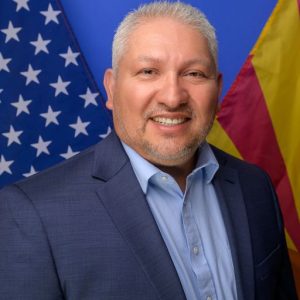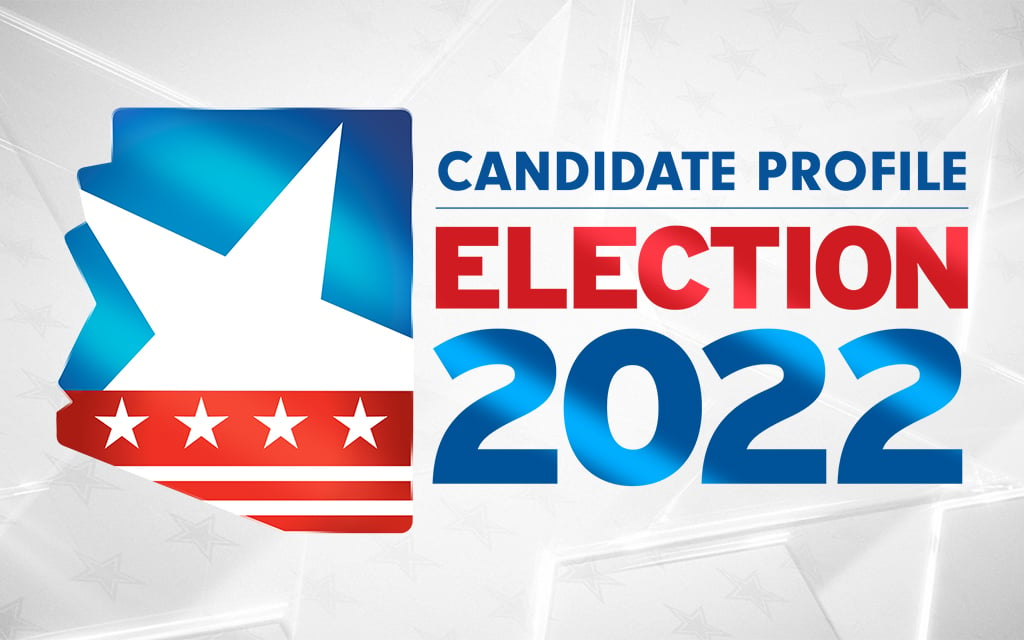
Political affiliation: Democrat
Position sought: U.S. representative in 5th District
Age: 51
Career: Attorney
Website: ramosaz.com
Javier Garcia Ramos has spent a total of $4,200 campaigning to represent Arizona in Congress. The Democratic candidate’s two opponents have spent a combined $1.2 million.
Garcia Ramos has refused all contributions, financing his campaign entirely on his own. Running for public office, he said, shouldn’t be reserved for the rich. Besides, he doesn’t want to owe anyone any favors or be obligated to anyone except voters.
“That’s how we will give the office back to the people.”
Garcia Ramos faces Republican incumbent Andy Biggs, who is favored to win. An independent candidate, Clint Smith, also is on the ballot. District 5 takes in Gilbert, Queen Creek, parts of Chandler and eastern Mesa.
Garcia Ramos is a tribal attorney for the Gila River Indian Community and previously served as a tribal attorney in Washington, D.C., and as Arizona assistant attorney general.

Javier Garcia Ramos (Photo courtesy of the Javier Garcia Ramos campaign)
A resident of Queen Creek, he was raised in a small migrant farming community and grew up working in the agricultural fields near Phoenix. Spanish was his first language. On his website, he says he was raised by a single mother and his grandmother, who taught him the value of hard work.
“My mom pulled us out of those onion fields, got her bachelor’s degree and a master’s degree in education and became bilingual teacher of the year in Arizona.”
His campaign emphasizes water management, better pay for educators, accessibility of voting and access to abortion, among other issues.
On his campaign website, Garcia Ramos calls Arizona’s return to a pre-statehood abortion law “draconian” and says he supports a national law protecting a woman’s right to choose.
“Neither the federal government nor any state or local government has any right to interfere with a woman’s access to abortion or any other medical procedure.”
In addition, he would defend legal protections for same-sex marriage.
Garcia Ramos also criticizes conservative efforts “to enshrine extreme interpretations of Christian beliefs into law.”
“I find it infuriating when they misuse the term ‘freedom of religion’ to justify discrimination against certain populations and the restrictions of individual liberties. They have it all wrong.”
Q: Why are you interested in this job?
“I’m doing it because I want to create the Arizona that’s good for all of us. I have no other angle, other than to stand up for my family and for all of us, to stand up for a woman’s right to choose, to stand up for the elderly to have a dignified retirement, to stand up for our voting rights, to stand up for our democracy, to stand up for our republic – that’s all.”
Q: What in your past work, political or volunteer experience makes you the best candidate?
Garcia Ramos points to his experience working locally, nationally and internationally as a lawyer and policymaker. His past experience includes serving as an assistant Arizona attorney general, as deputy city attorney of Peoria and as an attorney for the Navajo Nation in Washington, D.C. He currently is assistant general counsel for the Gila River Indian Community.
Q: What are the major issues facing Arizona?
Garcia Ramos said he supports the DREAM Act, which would provide a path to legal status for undocumented people who came to the U.S. as children.
“I just happened to be the luck of the draw on being born here. All of my family is from Mexico.”
Creating a “humane and safe border is important,” he said.
“It’s a two-way street: reduce drug dependence (and) stop our gun shipments to Mexico. We have to provide more health care services for our citizens here so there’s less demand for those drugs.”
Water is another critical issue for the state.
“We have to put this at the forefront. My constituents, Pinal County farmers, are getting hit the worst.”
He said that although he supports Second Amendment rights and is a hunter, he opposes military-grade weapons in the hands of the public.
“I went hunting with my son on the North Rim of the Grand Canyon last weekend. We used our rifles for elk hunting. Those have a purpose. A shotgun or a handgun have a purpose: home defense. What’s the purpose of an AR-15 military grade gun? What’s the purpose other than mass killing?”
Q: What will be your top priorities if elected?
“The top ones are Roe v. Wade, protecting our democracy, protecting our voting rights and the whole water issue.”
In a recent debate on Arizona PBS, Garcia Ramos said he is the only candidate who wants to codify Roe v. Wade at the federal level instead of leaving it up to the states.
“What we are going to have is females running state to state to state (for abortion services), and that is not correct. We want equality between men’s health care and women’s reproductive rights.”
Q: How will you work to improve bipartisanship in politics?
“It’s healthy to have two parties to discuss issues. But the Republican Party is so far out there that we can’t even discuss anything with them.
“There are some principles that you should never abandon, such as a woman’s right to her own reproductive health. … There are some things that you cannot have bipartisanship. You’ve just got to stand up for your principles.”
Q: Do you have any concerns about the security of our elections?
“The Republican side is trying to make it harder for people to vote or register to vote. They say there’s all this rampant fraud. There is no fraud. This has been looked at so many times. I’m trying to make it easier for people to vote.”
Garcia Ramos said he represented in court a Navajo woman who couldn’t vote under Arizona’s voter ID laws, which require two forms of identification.
The woman, he said, “was born at home, never drove, did not have a driver’s license, didn’t have a Social Security card, didn’t have a birth certificate card. She did not have any form of ID, and they denied her the right to vote as a Native American.”
The case eventually was settled to allow tribal identification as a form of voter ID, he said.
He also said he supports reinstating Section 5 of the Civil Rights Act, which would require “any changes to state voting laws to require federal government pre-clearance to make sure that voter law would not affect minorities.”
Q: What is a personal challenge that you feel you need to overcome?
“That I’m less than.”
“In third grade, when kids chased each other in grade school, it was my turn to be chased. A girl looked at me and said, ‘I don’t chase dirty Mexicans.’ I looked at my clothes, they were dirty. My shoes were ripped. And I realized that I was different.”
As an adult, he said, he was on a golf course once when another attorney he’d never met told him, “I like how you cut the grass out here. I like what you did.”
“I’m fighting to prove myself. I’ve done all this, but it doesn’t matter what I do. People are still going to see me one way.”
Q: Please share a quote or advice that you live by.
“We’ve got to co-create with nature, heaven and earth to create the world that we want.
“You’re talking to a Mexican-American who’s worked on Navajo land. Once you get balance in life, you get beauty – beauty in front of you, beauty behind you, beauty on your side, beauty all around you. That’s their (Navajo) philosophy. And that’s the best I can explain it: Walk in beauty.”
Q: What should be done, if anything, about border security?
“It’s not the immigrant trying to get a job that we should worry about,” Garcia Ramos said, noting he thinks the real problems are drugs and guns.
“We definitely have to stop the guns from flowing into Mexico. It’s a two-way street. Drugs are being processed through Mexico to here, (and the) majority is consumer driven. We’ve got to take care of our drug issue here.”
He does not support a completely open border, but he rejects “putting people in cages.”
“We’re an immigrant nation and we have to be humane.”
Q: What should the state or federal government be doing to mitigate the ongoing drought and address Arizona’s water issues?
Three things have to happen, he said during a recent debate on Arizona PBS: water conservation, desalination of water from the Gulf of Mexico and a workable drought contingency plan.
California has priority over Arizona for Colorado River Basin water, he said.
“They’re beating us to the punch; they’ve already beat us in the Supreme Court cases. They’re not participating in putting water back (and) they’re using more and more and more and more.”
If California and Upper Basin states can’t agree on water distribution, “the federal government is going to step in and tell everybody what to do.”
Garcia Ramos, who said he has been talking about water problems for 20 years, supports a plan Gov. Doug Ducey signed into law this summer to spend $1 billion on projects that will bring more water to Arizona.

